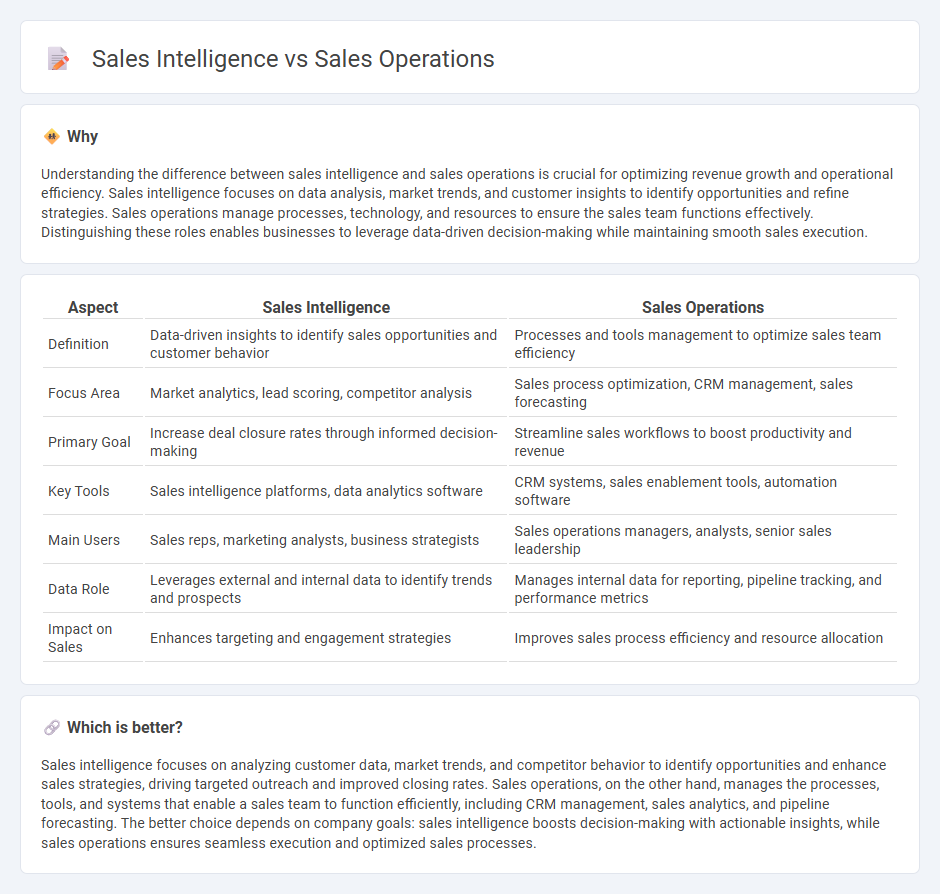
Sales intelligence focuses on gathering and analyzing data about potential customers, market trends, and competitor activities to enhance sales strategies and decision-making. Sales operations centers on streamlining and optimizing the internal sales processes, including CRM management, forecasting, and performance tracking to improve overall efficiency. Explore how integrating sales intelligence with sales operations can drive revenue growth and operational excellence.
Why it is important
Understanding the difference between sales intelligence and sales operations is crucial for optimizing revenue growth and operational efficiency. Sales intelligence focuses on data analysis, market trends, and customer insights to identify opportunities and refine strategies. Sales operations manage processes, technology, and resources to ensure the sales team functions effectively. Distinguishing these roles enables businesses to leverage data-driven decision-making while maintaining smooth sales execution.
Comparison Table
| Aspect | Sales Intelligence | Sales Operations |
|---|---|---|
| Definition | Data-driven insights to identify sales opportunities and customer behavior | Processes and tools management to optimize sales team efficiency |
| Focus Area | Market analytics, lead scoring, competitor analysis | Sales process optimization, CRM management, sales forecasting |
| Primary Goal | Increase deal closure rates through informed decision-making | Streamline sales workflows to boost productivity and revenue |
| Key Tools | Sales intelligence platforms, data analytics software | CRM systems, sales enablement tools, automation software |
| Main Users | Sales reps, marketing analysts, business strategists | Sales operations managers, analysts, senior sales leadership |
| Data Role | Leverages external and internal data to identify trends and prospects | Manages internal data for reporting, pipeline tracking, and performance metrics |
| Impact on Sales | Enhances targeting and engagement strategies | Improves sales process efficiency and resource allocation |
Which is better?
Sales intelligence focuses on analyzing customer data, market trends, and competitor behavior to identify opportunities and enhance sales strategies, driving targeted outreach and improved closing rates. Sales operations, on the other hand, manages the processes, tools, and systems that enable a sales team to function efficiently, including CRM management, sales analytics, and pipeline forecasting. The better choice depends on company goals: sales intelligence boosts decision-making with actionable insights, while sales operations ensures seamless execution and optimized sales processes.
Connection
Sales intelligence provides critical data insights and market analytics that empower sales operations to optimize strategies, forecast accurately, and streamline workflows. Integrating sales intelligence tools enhances the efficiency of sales operations by identifying high-potential leads and improving resource allocation. This connection drives revenue growth through data-driven decision making and operational excellence.
Key Terms
Process Optimization (Sales Operations)
Sales operations streamlines sales processes by implementing data-driven strategies, optimizing resource allocation, and enhancing workflow efficiency to boost revenue growth. Sales intelligence complements this by providing actionable insights from customer data, market trends, and competitor analysis, enabling informed decision-making. Explore how integrating these functions can maximize sales performance and elevate your business outcomes.
Data Analytics (Sales Intelligence)
Sales operations streamline sales processes and manage CRM systems, while sales intelligence focuses on data analytics to provide actionable insights on customer behavior and market trends. Leveraging advanced analytics tools, sales intelligence converts raw data into predictive models that enhance lead scoring, pipeline management, and revenue forecasting. Explore how integrating sales intelligence with operations can optimize performance and drive growth.
CRM Systems
Sales operations optimize CRM systems to streamline pipeline management, forecast accuracy, and territory alignment, enhancing overall sales efficiency. Sales intelligence integrates external data sources with CRM platforms to provide actionable insights on customers, competitors, and market trends. Discover how combining sales operations and intelligence can transform your CRM strategy for better revenue growth.
Source and External Links
Sales operations - Wikipedia - Sales operations is a set of business activities and processes that help a sales organization run effectively and efficiently by supporting business strategies and objectives; activities include sales force enablement, business analytics, sales administration, attainment planning, and operations design, often involving liaison with other departments like finance and marketing.
Sales Operations (Sales Ops) - DealHub - Sales operations drives revenue and helps sales teams close deals faster by promoting operational efficiency, managing training, analyzing data to predict revenue, eliminating bottlenecks, and aligning sales with marketing, finance, and product teams as part of RevOps.
Sales Operations: The Ultimate Guide [2025] - Mailshake - Sales operations focus on optimizing sales team performance by developing processes, analyzing data, creating CRM systems, and devising strategies to improve KPIs such as win rate and forecast accuracy while requiring skills in data analysis, CRM, and process automation.
 dowidth.com
dowidth.com